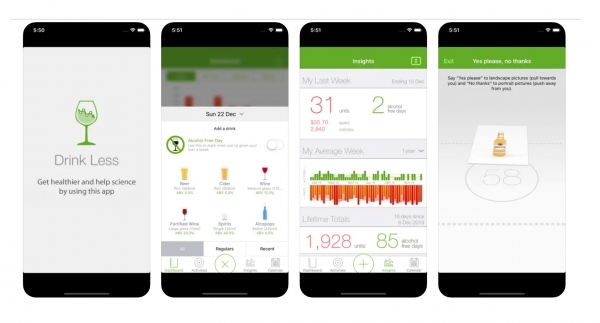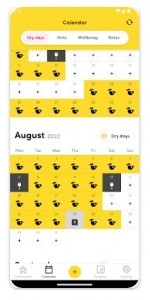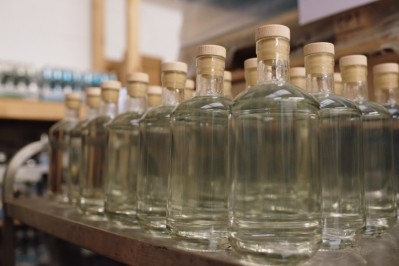Can apps help people reduce their alcohol intake?

Up to now, data has been thin on the ground. But researchers from University College London (UCL) and the University of Bristol have just published the results from a first-of-its kind trial - finding their app was effective at reducing consumption.
The app was shown to be effective at helping people who drink heavily and have the most to gain by cutting back.
Around 20% of the adult population in the UK drink at levels that could increase their risk of ill health. That means effective apps could target a large portion of the population and deliver significant healthcare savings.
'Small but significant' progress
The UCL study is significant because it is the first randomised controlled trial of an alcohol reduction app for the general population in the UK.
It covered 5,602 participants over six months. All were deemed as increasing or higher risk drinkers who were interested in reducing their alcohol consumption. They were randomly assigned to either the NHS alcohol advice webpage or a link to download the free Drink Less app: which was developed by behavioral scientists at UCL.
In their study, published in eClinicalMedicine and funded by the National Institute for Health and Care Research (NIHR), participants using Drink Less reduced their drinking by 39 units a week. That’s two more units a week, on average, than a control group who were referred to standard National Health Service advice.
"Reducing intake by an extra two units a week on average may seem small but is significant both in terms of preventing potential health harms as well as reducing costs to the NHS,” said lead author Dr Melissa Oldham from the UCL Institute of Epidemiology & Health Care.
In fact, the team estimate that if the app was rolled out widely it could save the NHS hundreds of millions of pounds over 20 years.
The app was even more helpful for female participants, who reduced their drinking by an additional 2.5 units a week compared to women who were referred to the NHS advice webpage.
The Drink Less app allows people to set goals, record how much they drink and log their mood and sleep quality after drinking. It also demonstrates progress towards goals and offers feedback and support with action plans for situations where users would usually drink.
Another feature is the app shows each drinker how their intake compares to the general population – which can come as a shock as most people underestimate how much they drink, said the researchers.
85% success rate for app from Dry Jan
Alcohol Change UK - the organisation behind Dry January - has its own app to help people reduce drinking. And if it's results over the last five years are anything to go by, apps could have a much more drastic effect at reducing alcohol intake.
TRY DRY is targeted at those who want to cut down on alcohol: and has had more than a million downloads since it was launched in 2018.
On average, baseline drinking (when people first start using the app) comes in at 35.7 units a week (two and a half times the UK low-risk drinking guidelines of 14 units a week).
After six months, the average drinking level is just 5.6 units a week, according to data gathered by Alcohol Change via the app.
85% of people using Try Dry for six months 'successfully get their drinking under control', says Alcohol Change.
The app is free, ad-free, and was co-created with drinkers and based on behavioral science. It tracks units, calories and money saved; allows users to set their own goals, and includes motivational reminders.
Digital promise
Why is this all important? Many countries have overstretched health systems with alcohol-related incidents and diseases putting a burden on care. Digital interventions have the potential to reach a large number of people at relatively low cost.
In the UK, fewer than 7% of increasing and higher risk drinkers receive face-to-face interventions in primary care to support alcohol reduction.
There’s a large number of apps available via Apple or Google which cater for everyone from those wanting to cut back on alcohol to those recovering from addiction.
Most are free: and a key feature is the ability to track daily alcohol intake alongside clear graphs and visuals to help people see their consumption and progress.
Another app - Daybreak Alcohol Support - also wants to help users change their relationship with alcohol, whether reducing intake or complete abstinence. It contains a drink tracker, a peer community and suggests activities to help with reducing alcohol intake.
Meanwhile, ‘I am Sober’ – a free app to track addiction recovery – counts 127M+ daily pledges made to stay sober. Along with tracking sober days, it helps build new habits and connects users to a community all striving towards the same goal, with the aim of tackling one day at a time. It also offers a sobriety calculator to show how much money and time has been saved, as well as looking at patterns in easier or harder days to identify triggers.
While research into the effectiveness of apps is currently limited, other investigations have also pointed to their potential. A 2023 study of 1,770 Swiss university students, for example, found that a smartphone app was effective at limiting the average drinking volume of those who had self-reported unhealthy alcohol use: with 'significantly lower' drinking outcomes in the app group than the control group.
However, such apps do require a certain amount of willpower (the UCL study, for example, covered participants who wanted to reduce their drinking). And previous studies have suggested that socioeconomic status (education, occupation and income) can impact how effective digital interventions are.
While smartphones and apps are a way of life for many, they are not accessible and user-friendly to all (In the UK, around 84% of the population has access to a smartphone).
The design of the app may also influence its effectiveness: while the UCL app was developed by the university's behavioral scientists, others don't have the same scientific backing.
"Despite the availability of hundreds of alcohol-related apps in commercial app stores, none had been evaluated in an RCT among the general population of adults in the UK," noted Dr Oldham of UCL.
"Furthermore, many of the smartphone apps available in the app store have been developed without reference to scientific evidence or theory."
But the Drink Less app shows that good propositions do exist - and can be scaled up. The Drink Less app is already widely used (>70,000 unique users since its launch in 2016), highly rated by users (4.5/5 stars as of May 2023) and highly visible (included in the top 5 results for ‘alcohol’ searches) on the Apple app store (it is not yet available on Android).
Finding the right strategy
Ultimately, such interventions should play part of a comprehensive government strategy to reduce alcohol consumption and alcohol harm.
Dr Sadie Boniface, Head of Research at the Institute of Alcohol Studies, said: "NICE [The National Institute for Health and Care Excellence] already recommends digital interventions as an add-on to existing services, so having an app which we know is effective is very welcome news. If the Drink Less app can be scaled up and rolled out more widely, it holds promise for population health.
"However, as is the case with a lot of digital health apps, decision-makers should be mindful that these don’t suit everybody. Apps are one valuable tool in the box, but there is no silver bullet for alcohol harm. What we really need is a national strategy that includes apps alongside other interventions and policies which we know work, such as making alcohol less cheap, not as readily available, less heavily marketed, and improving access to alcohol treatment and support."
Other measures include addressing the availability, marketing and price of alcohol - such as Scotland’s Minimum Unit Pricing policy.









